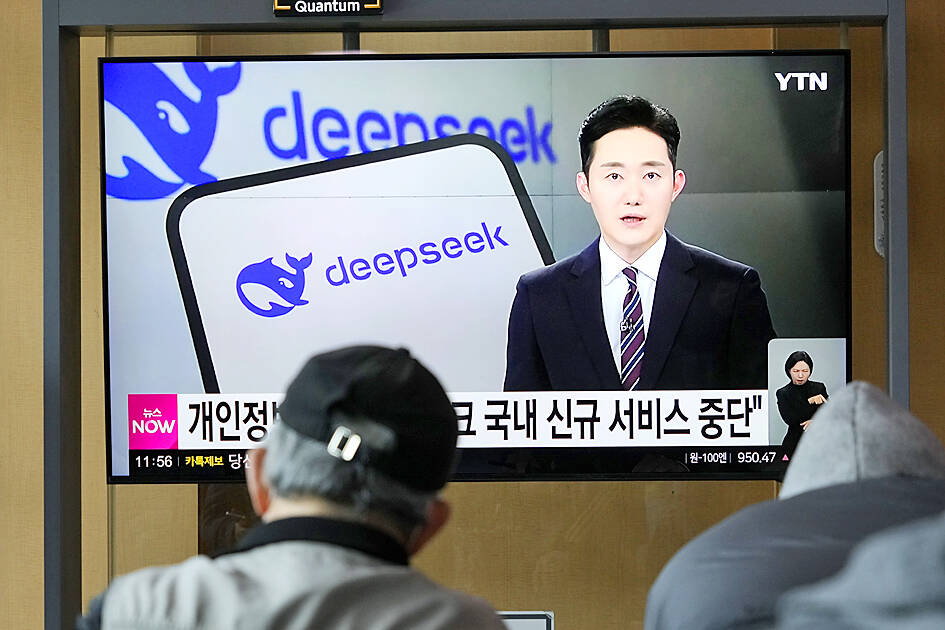Chinese artificial intelligence (AI) app DeepSeek would not be available to download in South Korea pending a review of its handling of user data, Seoul authorities said yesterday.
DeepSeek’s R1 chatbot stunned investors and industry insiders with its ability to match the functions of its Western rivals at a fraction of the cost, but a number of countries have questioned its storage of user data, which the firm says is collected in “secure servers located in the People’s Republic of China.”
The South Korean Personal Information Protection Commission said that DeepSeek would no longer be available for download until a review of its personal data collection practices was carried out.

Photo: AP
The Chinese AI firm has “acknowledged that considerations for domestic privacy laws were somewhat lacking,” the data protection agency said.
It assessed that bringing the app into line with local privacy laws “would inevitably take a significant amount of time,” it added.
“To prevent further concerns from spreading, the commission recommended that DeepSeek temporarily suspend its service while making the necessary improvements,” it said.
DeepSeek has “accepted” that proposal, it added.
The app was removed from local app stores on Saturday at 6pm and remains unavailable. It can still be used by those who have already downloaded the app.
The commission said it “strongly advised” people to “use the service with caution until the final results are announced.”
That included “refraining from entering personal information into the DeepSeek input field,” it said.
Analyst Youm Heung-youl said that the firm has yet to lay out a privacy policy “specifically tailored” for users in South Korea.
“It has on the other hand disclosed a privacy policy for the EU and certain other countries, stating that it complies with the domestic laws of those nations,” said Youm, a data security professor at Soonchunhyang University.
Asked about the app’s removal, Beijing yesterday said that it asked Chinese firms to run their “overseas operations on the basis of strict abidance by local laws and regulations.”
Chinese Ministry of Foreign Affairs spokesman Guo Jiakun (郭嘉昆) also urged “relevant countries” to “avoid taking measures that overstretch the concept of security or politicize trade and technology issues.”
This month, a slew of South Korean government ministries and police said they blocked access to DeepSeek on their computers.
Italy has also launched an investigation into DeepSeek’s R1 model and blocked it from processing Italian users’ data.
Australia has banned DeepSeek from all government devices on the advice of security agencies.
US lawmakers have also proposed a bill to ban DeepSeek from being used on government devices over concerns about user data security.
In response to the bans, the Chinese government has insisted it “has never and will never require enterprises or individuals to illegally collect or store data.”

FORCED LABOR: A US court listed three Taiwanese and nine firms based in Taiwan in its indictment, with eight of the companies registered at the same address Nine companies registered in Taiwan, as well as three Taiwanese, on Tuesday were named by the US Department of the Treasury’s Office of Foreign Assets Control (OFAC) as Specially Designated Nationals (SDNs) as a result of a US federal court indictment. The indictment unsealed at the federal court in Brooklyn, New York, said that Chen Zhi (陳志), a dual Cambodian-British national, is being indicted for fraud conspiracy, money laundering and overseeing Prince Holding Group’s forced-labor scam camps in Cambodia. At its peak, the company allegedly made US$30 million per day, court documents showed. The US government has seized Chen’s noncustodial wallet, which contains

SUPPLY CHAIN: Taiwan’s advantages in the drone industry include rapid production capacity that is independent of Chinese-made parts, the economic ministry said The Executive Yuan yesterday approved plans to invest NT$44.2 billion (US$1.44 billion) into domestic production of uncrewed aerial vehicles over the next six years, bringing Taiwan’s output value to more than NT$40 billion by 2030 and making the nation Asia’s democratic hub for the drone supply chain. The proposed budget has NT$33.8 billion in new allocations and NT$10.43 billion in existing funds, the Ministry of Economic Affairs said. Under the new development program, the public sector would purchase nearly 100,000 drones, of which 50,898 would be for civil and government use, while 48,750 would be for national defense, it said. The Ministry of

SENATE RECOMMENDATION: The National Defense Authorization Act encourages the US secretary of defense to invite Taiwan’s navy to participate in the exercises in Hawaii The US Senate on Thursday last week passed the National Defense Authorization Act (NDAA) for Fiscal Year 2026, which strongly encourages the US secretary of defense to invite Taiwan’s naval forces to participate in the Rim of the Pacific (RIMPAC) exercise, as well as allocating military aid of US$1 billion for Taiwan. The bill, which authorizes appropriations for the military activities of the US Department of Defense, military construction and other purposes, passed with 77 votes in support and 20 against. While the NDAA authorizes about US$925 billion of defense spending, the Central News Agency yesterday reported that an aide of US

The combined effect of the monsoon, the outer rim of Typhoon Fengshen and a low-pressure system is expected to bring significant rainfall this week to various parts of the nation, the Central Weather Administration (CWA) said. The heaviest rain is expected to occur today and tomorrow, with torrential rain expected in Keelung’s north coast, Yilan and the mountainous regions of Taipei and New Taipei City, the CWA said. Rivers could rise rapidly, and residents should stay away from riverbanks and avoid going to the mountains or engaging in water activities, it said. Scattered showers are expected today in central and